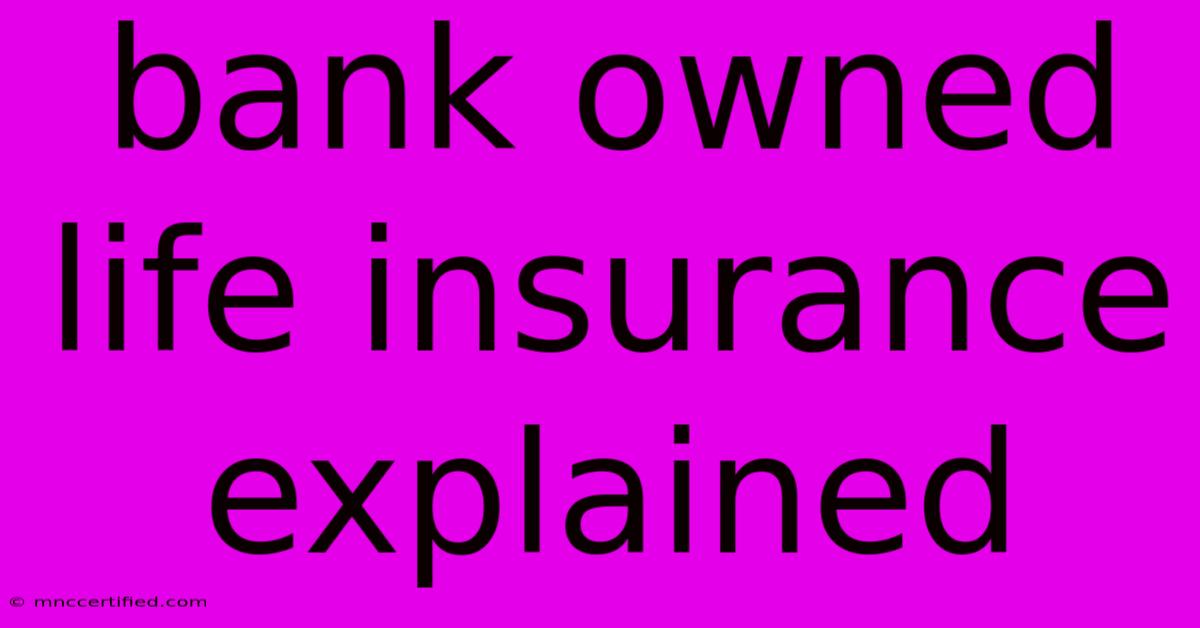Bank Owned Life Insurance Explained

Table of Contents
Bank Owned Life Insurance: What It Is and Why You Should Care
Have you ever heard of "bank owned life insurance" and wondered what it is and how it might affect you? This term may sound intimidating, but understanding it can empower you to make informed financial decisions. Let's dive into the world of bank owned life insurance, exploring its definition, implications, and potential impact on your finances.
What is Bank Owned Life Insurance?
Bank owned life insurance, also known as "bank-owned life insurance" or "BOLI", refers to life insurance policies held by banks as assets. These policies are typically purchased on the lives of borrowers who have taken out large loans from the bank.
Here's how it works:
- Loan Borrower: A borrower secures a significant loan from the bank, often for a commercial property or business acquisition.
- Life Insurance Policy: The borrower purchases a life insurance policy, naming the bank as the beneficiary. This policy acts as collateral for the loan.
- Bank Ownership: The bank owns the life insurance policy and receives the death benefit upon the borrower's passing.
Why Do Banks Use BOLI?
Banks employ BOLI strategies for several reasons:
- Loan Security: It provides the bank with a safety net in case the borrower dies and cannot repay the loan. The death benefit ensures the bank can recover its investment.
- Investment Opportunity: Life insurance policies, particularly permanent life insurance, can offer potential growth and tax advantages.
- Risk Mitigation: Banks can reduce the risk of loan default by having a death benefit to cover the outstanding balance.
How Does BOLI Impact You?
While BOLI primarily affects banks and borrowers, it can indirectly influence you as a consumer:
- Increased Loan Costs: Banks may incorporate the cost of BOLI premiums into the overall loan interest rate, potentially leading to higher borrowing costs for you.
- Reduced Credit Availability: Banks may be more cautious in lending to borrowers who cannot afford both loan payments and life insurance premiums, potentially limiting your access to credit.
Considerations for Borrowers
If you are considering taking out a large loan from a bank, it's crucial to understand the potential use of BOLI:
- Transparency: Ask your lender explicitly about whether they will require a BOLI policy.
- Cost Comparison: Compare the costs of different loan options, including those with and without BOLI requirements.
- Alternative Solutions: Consider alternative loan options or explore other collateral possibilities to avoid BOLI if necessary.
Key Takeaways
Bank owned life insurance plays a significant role in the financial landscape, primarily impacting banks and their borrowers. Understanding BOLI can empower you to make informed decisions regarding your financial needs, particularly when considering large loans. Always remember to inquire about the use of BOLI, compare loan options, and seek professional advice when navigating complex financial situations.

Thank you for visiting our website wich cover about Bank Owned Life Insurance Explained. We hope the information provided has been useful to you. Feel free to contact us if you have any questions or need further assistance. See you next time and dont miss to bookmark.
Featured Posts
-
Embrace Vs Nationwide Pet Insurance
Nov 13, 2024
-
Steph Curry Says Night Night To Mavericks In Warriors Win
Nov 13, 2024
-
Cyber Insurance For Public Entities
Nov 13, 2024
-
Liquor Liability Insurance Michigan
Nov 13, 2024
-
Trumps Education Department Closure The Fallout
Nov 13, 2024